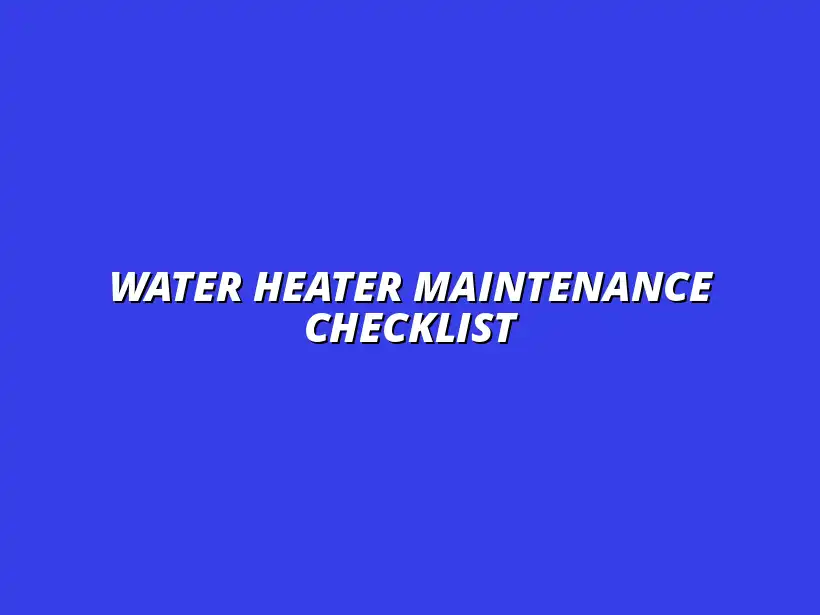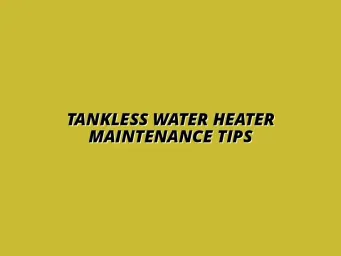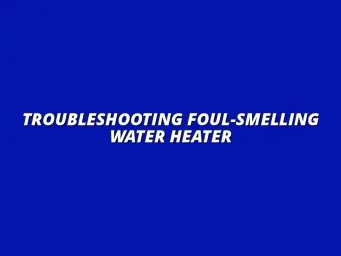
Water Heater Maintenance Checklist
Understanding the Importance of a Water Heater Maintenance Schedule
Having a water heater maintenance schedule is essential for homeowners who want to ensure their water heater operates efficiently and reliably. Regular maintenance not only helps prevent unexpected breakdowns but also extends the lifespan of the system, saving you money in the long run. By staying on top of maintenance tasks, you can enjoy consistent hot water and reduce the risk of costly repairs.
Additionally, a well-maintained water heater contributes to energy efficiency, which can lower your utility bills. When your water heater operates smoothly, it doesn’t have to work as hard, resulting in less energy consumption. In this way, a solid maintenance schedule is an investment that pays off in both comfort and savings. For more tips on maintaining your water heater, check out these regular water heater inspection tips.
The Role of Regular Maintenance in Extending Water Heater Lifespan
Regular maintenance plays a significant role in extending the lifespan of your water heater. By routinely checking and servicing your unit, you can address small issues before they escalate into major problems. This proactive approach not only preserves the performance of your water heater but also maximizes its operational life.
Overall, a consistent maintenance routine can lead to a lifespan of up to 15 years or more for your water heater. Here are a few key benefits of regular maintenance:
- Prevention of rust and corrosion
- Improved energy efficiency
- Reduction in unexpected breakdowns
- Enhanced performance and reliability
How Routine Inspections Can Prevent Costly Repairs
Routine inspections of your water heater can be a game-changer when it comes to preventing costly repairs. During these inspections, a technician can spot minor issues—like leaks or sediment buildup—before they become major, expensive fixes. In fact, addressing these problems early can save you hundreds, if not thousands, of dollars over time. Learning how to flush your water heater easily is a great preventative measure.
Some of the common inspection tasks include:
- Checking for leaks and rust
- Inspecting the anode rod
- Testing the temperature and pressure relief valve
- Flushing the tank to remove sediment
The Impact of Proper Maintenance on Energy Efficiency
Proper maintenance directly impacts your water heater's energy efficiency. By keeping the unit clean and addressing any mechanical issues, you ensure that the system operates at optimal performance. When water heaters are neglected, they have to work harder to heat water, leading to increased energy consumption. For a comprehensive checklist, see our guide on annual plumbing maintenance.
Implementing an effective maintenance schedule can lead to significant energy savings. A few practices to enhance energy efficiency include:
- Insulating the hot water pipes
- Setting your thermostat to 120°F
- Flushing the tank at least once a year
- Regularly checking the anode rod for wear
Key Components of a Water Heater Maintenance Schedule
To create an effective water heater maintenance schedule, it's important to know the key components that require regular attention. This schedule will help you stay organized and ensure that you perform essential tasks at the right intervals. Taking the time to plan these tasks will keep your water heater in top shape and avoid unexpected issues.
Each component of the maintenance schedule should reflect the unique needs of your water heater and your household. Let's explore the recommended frequency for inspections and seasonal checks in more detail. Remember, regular bathroom checks are also important; see our advice on regular bathroom water heater checks.
When to Inspect and Service Your Water Heater
Being knowledgeable about when to inspect your water heater is crucial for maintaining its efficiency. Generally, you should check your water heater at least once every six months. However, depending on your water heater's age and usage, you may need to adjust this frequency.
Here are some guidelines for inspection frequency:
- Monthly: Visual checks for leaks or unusual noises
- Bi-annual: Detailed inspection and maintenance tasks
- Annual: Professional servicing to assess overall performance. For annual inspection tips, see our guide on annual water heater inspections.
Recommended Frequency for Inspections: Monthly, Bi-annual, or Annual?
Knowing how often to inspect your water heater can help maintain its performance. Monthly checks can help you catch minor issues early on, while bi-annual and annual inspections can ensure comprehensive assessments. Here's a breakdown of tasks based on inspection frequency:
- Monthly: Look for any signs of leakage or strange noises
- Bi-annual: Flush the tank and test the pressure relief valve
- Annual: Inspect the anode rod and check the overall condition of the heater
Seasonal Checks: Preparing Your Water Heater for Extreme Weather Conditions
Seasonal checks are particularly important in preparing your water heater for extreme weather conditions. Both high heat and freezing temperatures can affect its functionality. It's best to conduct a thorough inspection before the seasons change.
Here are some seasonal tasks to consider:
- Winter: Insulate your water heater and pipes to prevent freezing
- Summer: Flush the tank to remove sediment that builds up over time
- Spring: Check for leaks and test the temperature settings
- Fall: Schedule a professional inspection to prepare for winter
FAQs About Water Heater Maintenance Schedules
When it comes to keeping your water heater running smoothly, many homeowners have questions. A maintenance schedule is crucial for ensuring your heater operates efficiently and lasts as long as possible. In this section, I’ll cover common questions about what should be included in a maintenance checklist and the benefits of hiring a professional. For professional help, consider contacting a plumber in your area.
What Should Be Included in a Water Heater Maintenance Checklist?
A comprehensive water heater maintenance checklist helps you keep track of necessary tasks. By following these essential steps, you can ensure that your heater remains in top condition. Here’s a handy checklist to consider:
- Inspect the water heater for leaks.
- Flush and drain the tank to remove sediment.
- Check the anode rod and replace if necessary.
- Test the temperature and pressure relief valve.
- Inspect the electrical connections or gas line for safety.
Key Tasks for Homeowners to Include in Their Routine
In addition to the main tasks in your checklist, consider incorporating these key actions into your routine:
- Monitor water temperature settings regularly.
- Keep an eye on energy bills for unexpected changes.
- Be aware of any unusual noises coming from the heater.
By keeping these tasks in mind, you can proactively maintain your water heater and catch any problems early on. Don't forget the importance of healthy drainage; check out our tips on essential drainage for healthy landscaping.
How to Create a Personalized Maintenance Schedule
Creating a personalized maintenance schedule involves considering your unique situation. Here are some steps to build your own schedule:
- Determine the age and type of your water heater.
- Decide how often you can commit to maintenance tasks.
- Set reminders on your calendar for inspections and servicing.
By following these steps, you can develop a routine that works best for you and your water heater.
What Are the Benefits of Hiring a Professional for Water Heater Maintenance?
Sometimes, the best approach is to let the experts handle the job! Hiring a professional for your water heater maintenance can offer several benefits. Here are a few:
- Expert knowledge and experience in identifying issues.
- Access to specialized tools and techniques.
- Comprehensive inspections that may uncover hidden problems.
Pros and Cons of Professional vs. DIY Maintenance
It's essential to weigh the pros and cons when deciding between DIY maintenance and hiring a professional. Here’s a quick overview:
- Pros of hiring a pro: Saves time, ensures thoroughness, and reduces the risk of errors.
- Cons of hiring a pro: Can be more expensive, may require scheduling flexibility.
- Pros of DIY: Cost-effective, allows for learning about your water heater.
- Cons of DIY: Time-consuming, risk of missing critical issues.
Evaluating these factors can help you decide which option suits your needs best!
How Often Should a Professional Service Be Scheduled?
Scheduling professional service depends on various factors, such as the age of your water heater and how often it’s used. Generally, it’s advisable to have your water heater serviced at least once a year. However, if you notice any signs of trouble, such as leaks or strange noises, you should call a pro sooner.
In some cases, water heaters may benefit from more frequent check-ups. For example, if you have hard water, consider scheduling service every six months.
Final Thoughts on Maintaining Your Water Heater
Maintaining your water heater is not just about fixing problems when they arise; it's about developing a long-term plan. By staying proactive, you can ensure your water heater operates efficiently, saving you time and money in the long run.
Developing a Long-term Maintenance Plan for Your Home
To develop a long-term maintenance plan, integrate your water heater care into your overall home maintenance routine. Here’s how:
- Include water heater checks in your seasonal maintenance schedule.
- Set reminders for routine inspections and service.
- Educate family members about basic water heater care.
By incorporating these steps, you’ll create a sustainable maintenance routine that benefits your entire home.
Integrating Water Heater Maintenance into Your Home Care Routine
Integrating water heater maintenance doesn’t have to be complex! Simply add it to your monthly or seasonal home maintenance tasks. This can be as straightforward as checking your heater during your spring cleaning or checking it monthly when you pay your utility bills.
Consistency is key. Regular attention can help you identify minor issues before they escalate into costly repairs.
The Cost-Benefit Analysis of Regular Water Heater Maintenance
When you think about it, investing in regular maintenance can save you a lot of money in the long run. Here’s a quick breakdown:
- Reduced repair costs by catching issues early.
- Increased efficiency leading to lower energy bills.
- Extended lifespan of your water heater.
By analyzing these factors, it becomes clear that regular maintenance is not just an expense — it’s a smart investment!
Encouraging Preventive Care for Homeowners
Preventive care is vital for homeowners who want to avoid unexpected repairs and high costs. By staying informed and proactive, you can protect your home and your budget!
Resources and Tools for Effective Water Heater Maintenance
There are many resources available to help you maintain your water heater effectively. Consider the following:
- Manufacturer’s guidelines for your specific model.
- Online tutorials or videos for DIY maintenance tasks.
- Local HVAC professionals for guidance and services.
Utilizing these resources can empower you to take better care of your water heater!
How Early Intervention Can Save Money and Stress
Recognizing issues early can lead to significant savings. For example, addressing a small leak now could prevent it from turning into a major flood later! Stay alert for warning signs, and don’t hesitate to act when something seems off.
By fostering a culture of early intervention, you can alleviate stress and keep your home functioning smoothly!




